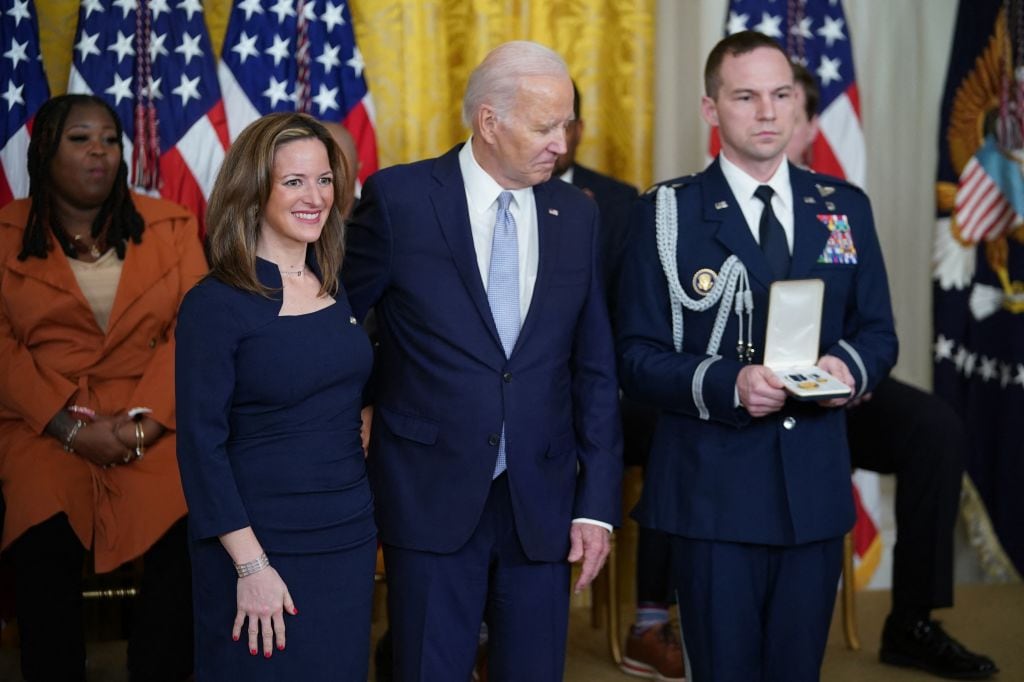A version of this post was originally distributed in Votebeat’s weekly newsletter. Sign up here.
Yesterday was the second anniversary of Jan. 6. Has Congress done enough to prevent future political violence driven by lies about elections?
While I give credit for the (again, nearly two years coming) passage of Electoral Count Act Reform in the recent omnibus package, the funding for elections in that bill amounted to a slap in the face for election administrators continuing to battle election conspiracy theorists to this day. It’s rare to read about voting systems in the United States without the inclusion of a word like “crumbling” or “antiquated.” We have known about these problems for more than a decade, and local officials and advocates have been clear about their needs.
For the last two years, local election administrators and elected officials have been consistently asking Congress to allocate $400 million for elections in the FY2023 omnibus. But as talks of the omnibus wore on, the number kept getting smaller. The first one I heard tossed around was $200 million — a tiny fraction of the actual need. Shockingly, $75 million was the final total.
In a statement calling the $75 million “a down payment,” Common Cause Director of Voting & Elections Sylvia Albert said the total was “a fraction of the investment that will be required to protect our elections and the will of voters from threats both foreign and domestic.”
Sam Oliker-Friedland, the executive director of the Institute for Responsive Government, equated the amount to dumping out a “bag of pennies on election official’s doorsteps.” Which is fabulous imagery, but also mathematically true, given how far $75 million will go spread out over more than 10,000 election jurisdictions. For context, the recent unsuccessful gubernatorial recall election in California cost the state a total of $200 million.
Why, you may ask, did Congress fling such a paltry sum at election offices nationwide, at a time when they are desperate for funds, elections administrators are leaving in droves, and threats are still coming in hot across the country?
Advocates and local officials who took part in the discussions tell me that election funding was used as a negotiating tool with Republicans, who were not as keen on it. And so, it shrank. The $75 million didn’t even merit a mention in the Senate Democrats’ summary of the package.
Given all the hullabaloo Democrats made over the need for election funding not too long ago, one might assume that Republicans — who now constitute a majority of the House — may have simply organizationally outmatched the Democrats in negotiations. One would then watch the news and reassess whether that is possible.
The party’s leader-in-waiting, Rep. Kevin McCarthy of California, failed to win sufficient support over multiple rounds of voting this week for his bid to be speaker of the house. It is the first time in more than a century that voting went beyond the first ballot. McCarthy lost repeatedly in humiliating fashion, despite having publicly moved into the office designated for the Speaker of the House on Monday. In fact, Rep. Matt Gaetz, one of the Republican members opposing him, wrote to the architect of the Capitol to ask how long McCarthy could reasonably occupy the space “before he is considered a squatter.”
This apparently formidable hurdle was foreseen (by everyone paying close attention). Still, Republicans failed to coalesce around McCarthy (or anyone) despite the advanced warning, leading to the following real-time characterizations of the GOP’s recent state: “Increasingly desperate”; “total collapse”; “circus”; “crisis of its own creation”; “on the verge of becoming a total clown show.”
The whole point of having a speaker of the House is to rally votes. In other words, speaker impasse aside, don’t expect a lot of productivity from this House of Representatives going forward.
So how much does it matter? Congress passed ECA reform. Wasn’t that the big response to January 6th? Isn’t the $75 million a bonus?
Not to local election offices who increasingly have less access to private grants, and whose states rarely — if ever — acknowledge the crumbling elections infrastructure they operate, leaving public servants to defend democracy with the equivalent of a handful of gravel. And certainly not to voters, who saw massive election administration problems in counties small and large, with a clear pattern of lack of resources and staff turnover to blame.
Yesterday, the president awarded the Presidential Citizens Medal, one of the nation’s highest civilian honors, to law enforcement officers and election workers who put themselves on the line defending democracy after the 2020 election and the U.S. Capitol against insurrectionists. Recipients include former Philadelphia City Commissioner Al Schmidt, Georgia election workers Shaye Moss and Ruby Freeman, Michigan Secretary of State Jocelyn Benson, and former Arizona House Speaker Rusty Bowers.
Will they be asked to do so again? Those who rallied around funding in 2022 (and 2021, and 2020, and 2019, and 2018 …) have pledged to try again this year. Two years after a violent mob seeking to overturn an election stormed the U.S. Capitol, let’s hope that history does not continue to repeat itself.
Back Then
So who was this guy (obviously, it was a guy) you keep hearing about who got elected after nine rounds of ballots 100 years ago in his bid to be speaker of the house? It was Frederick H. Gillett of Massachusetts.
Like McCarthy, he was despised by a faction of the Republican Party— that time, though, it was a progressive faction, and he’d already served as speaker for two terms. Ultimately he largely agreed to their demands and was re-elected in 1923.
It’s funny how even the faintest echoes of history can still be heard 100 years later.
New From Votebeat
Pinal County’s outgoing elections director collected a $25,000 bonus for running a smooth election despite reporting final results with significant inaccuracies, including around 500 uncounted votes in the neck-and-neck attorney general race, Jen Fifield reports for Votebeat Arizona.
In earlier stories, Jessica Huseman reported that the final recount results shrank the attorney general’s margin to a razor-thin 280 votes, and ballot-counting errors in Pinal County were largely responsible for the shift. And Fifield reported that in court last month, Arizona gubernatorial candidate Kari Lake’s legal team seized on a new explanation for some of the Election Day problems in Maricopa County, arguing it shows malicious intent that ultimately changed the election outcome.
Al Schmidt, a Republican who famously stood up to former President Donald Trump’s claims of election fraud in 2020 while receiving death threats, has been nominated to be Pennsylvania’s top election official, Carter Walker reports for Votebeat Pennsylvania.
Good-government advocates and voting experts say Pennsylvania should change a recount law that was weaponized by activists and delayed the state’s certification by several weeks. A Votebeat and Spotlight PA review of historical legislative records and news articles found that the 1927 provision has not been substantially updated in the near-century since its passage, and was designed to combat a type of fraud now easily detected by modern improvements to election administration, Walker reports for Votebeat Pennsylvania.
Michigan’s Board of State Canvassers in late December unanimously certified the results of the partial recount of the November election, leading to slight changes in vote tallies for two ballot proposals and confirming the original successful passage of both, Oralandar Brand-Williams reports for Votebeat Michigan.
Nearly two months after the general election, Harris County election officials still do not know whether ballot paper shortages and late polling site openings prevented people from voting on Election Day, Natalia Contreras reports for Votebeat Texas.
In Other Voting News
- Records and reporting show Oregon Secretary of State Shemia Fagan requested the resignation of state Elections Director Deborah Scroggin after sometimes overruling Scroggin, a “stickler” unwilling to make exceptions to rules and deadlines, because of concerns that the elections director wasn’t customer service-oriented enough, Willamette Week reported.
- Local election officials in Wisconsin and Nevada are the latest to provide documents recording their contact with key players attempting to overturn the 2020 presidential election to Jack Smith, the special counsel overseeing the Justice Department’s ongoing criminal investigation, CNN reported.
- New transcripts released by the U.S. House Committee investigating the events of January 6th shed additional light on the discussions in the White House leading up to former President Donald Trump’s decision to fire, via tweet, Chris Krebs, then the director of the Cybersecurity and Infrastructure Security Agency, the Washington Post reported.
- Lawyer Alan Dershowitz said he was simply a consultant to a lawsuit from GOP gubernatorial candidate Kari Lake and secretary of state candidate Mark Finchem seeking to ban the use of voting machines in Arizona, and should not be subject to legal sanctions for his limited role, the Arizona Republic reported. A federal judge last month dismissed the case and ordered sanctions against the lawyers involved, though Lake and Finchem have appealed the ruling.
Jessica Huseman is Votebeat’s editorial director and is based in Dallas. Contact Jessica at jhuseman@votebeat.org.




